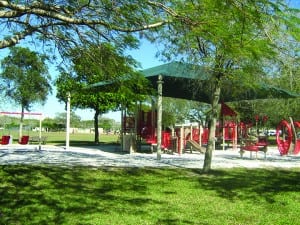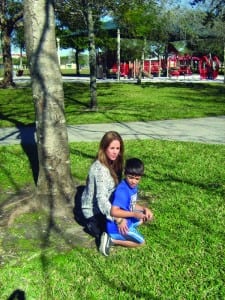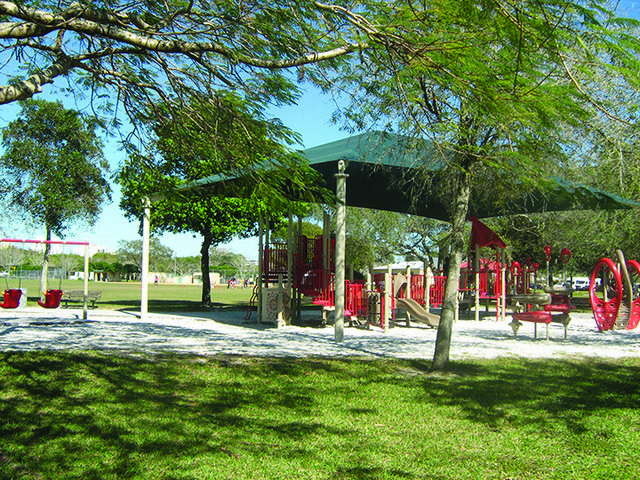
More than a year ago, Rebeca “Becky” Lowell launched a campaign to improve a children’s play area at Continental Park.
Her issue: the sandy ground cover for the children’s apparatus posed a safety hazard to youngsters like her three sons, “A.J.,” 8; Lucas, 6, and Marcus, 4, as well as other kids at the tots play corner, located at SW 102nd Street and 82nd Court.
A board member of the Continental Park Homeowners Association, she turned to Jack Kardys, Miami-Dade Parks director, to see if a permanent rubber-based flooring could replace the sand over a 6,100-square-foot area that includes a separate double swing set where constant use also creates hazardous pits under the swinging seats.
An area homeowner near the park for six years, she wrote Kardys in November 2014 describing several reasons why the sand should be replaced, noting “sand has deteriorated over the years and it’s never been replaced.
“There are many dangerous spots where tree roots, trash and fear of cats and dogs disposals in the sand create continual health issues, too,” she added.
Heavy rainfalls once created a 12-inch gap or “trench” between an adjacent walkway and a sandy area, an obvious concern for tripping, she said recently.

Kardys responded, visiting the park area with Joe Fernandez, park director, as did Parks architect, Michael Houle, and George Navarette, Parks liaison for capital improvements. They told Lowell that replacing the sand with a permanent cover is a costly project: $137,000 by one estimate for a PIP rubber cover or $100,881 for artificial turf.
Houle explained in an email that he had “walked” Lowell’s concern “up the chain and available money is the struggle we keep facing, meaning there really isn’t any” for the project.
Parks personnel followed up to alleviate some issues by leveling existing sand dips and a basic cleanup of the grounds to improve the sand cover.
Early in 2015, the nine-member HOA board, headed by president Holly White, took up Lowell’s cause, writing a formal letter to Miami-Dade County District 8 Commissioner Xavier Suarez in April pointing out they represented “the 800 homes” comprising the park neighborhood.
“The park is used daily,” the letter emphasized. “It is the center of activity for many families who live in the area.” It added pointedly that “revenues, which is realized from the rentals of facilities in Continental Park, far exceed the cost to maintain this park; in other words, we are a ‘donor park.’ One board member estimated the figure at near $250,000.
“We sent the letter to the unincorporated service board, Commissioner Suarez and anyone else we could think of,” White said in mid-February. “So far, we haven’t heard from anyone.”






